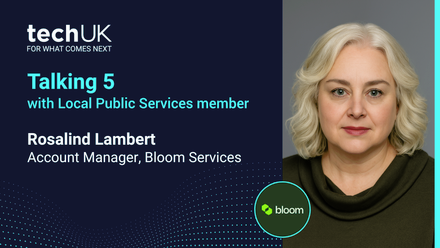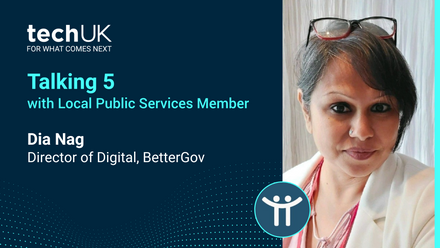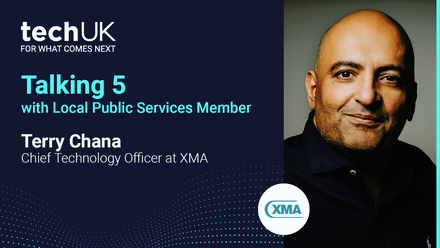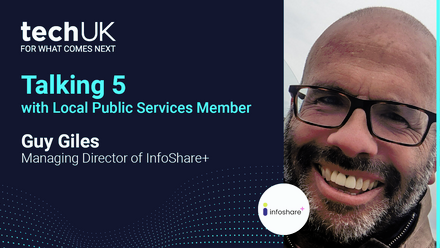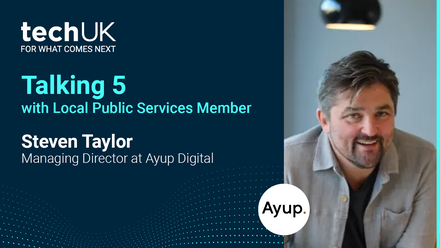Talking 5 with Local Public Services Member Kagool
Each month, techUK's Associate Director for Local Public Services, Georgina Maratheftis, interviews a member active in the local government space about their vision for the future of local public services and where digital can make a real difference to people and society. This month we talk with Clare Golby, Head of Public Affairs at Kagool, about the role that digital plays in streamlining services for residents, improving preventative services and cutting costs.
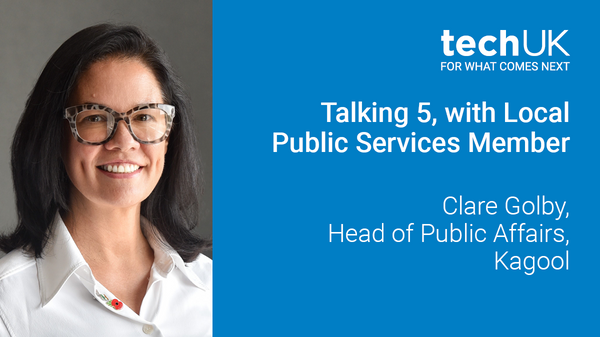
Welcome Clare. Firstly, tell me more about you, your career and how you got to this position today?
My name is Clare Golby and I’m the Head of Public Affairs at Kagool, a leading global data and analytics specialist headquartered in Coventry. I also hold several key roles in local Government. Most Notably Deputy Leader of Nuneaton and Bedworth Borough Council with responsibilities for housing and communities, and I chair the Adult Social Care & Health scrutiny committee at Warwickshire County Council.
I have over 17 years of experience working in IT data and operations and joined Kagool in 2021, having been made redundant from my previous role during the pandemic. After working for the same large construction company for 15 years I lost my job in IT & telecoms practically overnight.
Since starting my Public Affairs role I’ve helped shape the Kagool relationship within the local, national and international business landscape. I manage the relationships between Kagool and others, such as regional and national government agencies, policy makers, educational institutions & trade associations and I have, on a number of occasions, been invited to speak both nationally and internationally on behalf of Kagool, the tech sector and West Midland Region.
What is the greatest opportunity for local government when it comes to digital?
Making it easier for people to engage with local government and vice versa.
A single digital front door will not only streamline everyday service delivery for residents but allow local government to identify and provide pre-emptive services, to stop families going through the trauma of homelessness for example, or getting the right support services in place earlier to prevent a heavier intervention further down the line with something like adult social care.
I know full well predictive analytics would be a huge assistance in this area, particularly through efficient resource allocation based on demand.
Local government agencies hold reams of personal data on their residents. From home addresses to social care requirements, employment, housing, financial information and more, there’s a lot of valuable information floating around but, in most instances, the data is not aggregated or well connected. Different agencies, even different departments in the same council, hold pieces of information on each resident. If this is never joined up, a holistic view of individual residents or wider community need is impossible. Accurate and up-to-date data can give decisionmakers a holistic view of their communities on both a macro or micro level leading to better prioritisation of services.
What is your vision for the future of local public services and places?
With experience in the tech world and my local government roles I draw on a combination of sector knowledge, commercial solutions and considerations factored against public sector service delivery requirements.
Local government needs to acknowledge its limitations.
They are not tech industry experts, they are service delivery experts. Engage the right industry experts.
I like to take a ‘prevention is better than cure’ approach. I’d like to reduce inefficiencies and bloat to provide a more joined up service strategy.
With better use of digital we can improve preventative services, cut costs, increase service user satisfaction, and ensure that taxpayers’ money is being put to the best possible use.
Analytics can give a clear view of which services are most in need of resources or funding, or which we could afford to do without, cutting unnecessary waste in time and effort.
With better use of digital & data we could have better interdepartmental working, for example, quality of education could affect levels of unemployment, homelessness, poor health outcomes, its all connected. It can and should be connected by joint working to deliver the right connected services in the right place.
I know it can be done and would be transformational.

Georgina Maratheftis
Georgina is techUK’s Associate Director for Local Public Services


